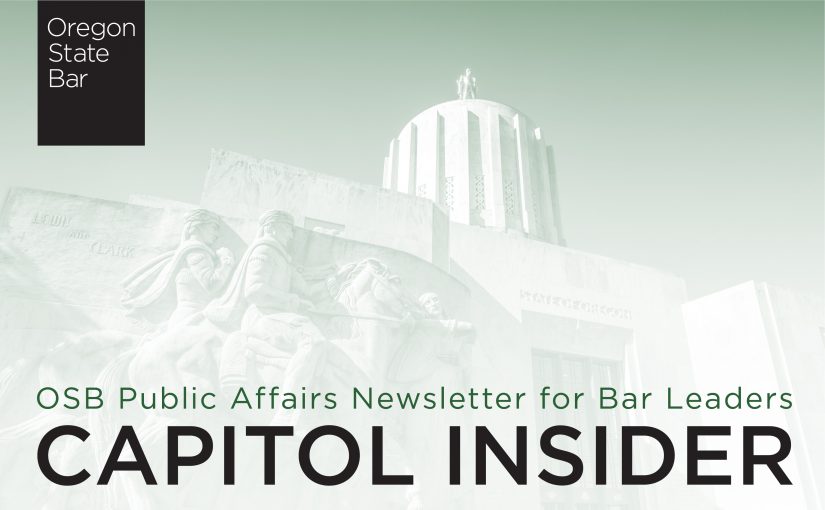Table of Contents
Budget Process Begins for Oregon Judicial Department
With the release of the Governor’s budget priorities and the Ways and Means budget priorities, the 2021–2023 budget process is underway. Over the next three months, the Ways and Means Subcommittees will be holding public hearings and work sessions as they craft agency and commission budgets, as well as the Oregon Judicial Department’s budget, to fund the next two years.
The Oregon Judicial Department proposed budget will receive its first of at least three public hearings in the Ways and Means Subcommittee on Public Safety on April 7, 2021. The first two days of hearings will focus on the proposed budget. This is an opportunity for the Oregon Judicial Department to discuss its current service level budget, the challenges it expects to face in the upcoming biennium, and its strategic plan and policy goals. Legislators will have an opportunity to ask questions and request additional information. On the third day of testimony, there will be an opportunity for the public to provide testimony on the proposed budget.
This year, for the first time, state funding for civil legal services is included in the Oregon Judicial Department’s budget as a pass-through to the Oregon State Bar’s Legal Services Program. The Oregon Law Commission and the Council on Court Procedures also receive pass-through funding from the Oregon Judicial Department.
The Oregon Judicial Department’s strategic campaign commitments for the 2021–2023 biennium, reflected in the policy proposals housed in the budget, are:
-
-
- Improve services and outcomes for people who are underserved, vulnerable, or marginalized.
- Eliminate barriers to access to justice by simplifying and streamlining processes and forms, enhancing service options, leveraging technology, improving interpreter services, and keeping courts open, safe, and secure.
- Enhance the public’s trust and confidence in Oregon’s state government by listening and responding to the needs of those we serve, holding ourselves to high standards, and communicating the role of our courts in providing justice for all.
- Create a workplace and courthouse culture that is supportive, inclusive, welcoming, and affirming; that embraces diversity; and where all people can thrive and are treated with respect and dignity.
-
The Public Defense Services Commission will also go through the legislature’s budget process. Its first budget hearing has not been scheduled.
Public Records and Public Meetings Bills of Interest
This session, public records and public meetings bills are being considered in a number of committees. Three of the bills that have received public hearings are:
-
-
- HB 2478 – Maintains indefinitely exemption from required disclosure of public records that are subject to lawyer-client privilege and public records exemption for privileged information.
- HB 2485 – Requires state agencies to reduce public records request fees by 50 percent if request is made in public interest, and requires state agencies to entirely waive fees if public records request is in public interest and narrowly tailored.
- SB 666 – Modifies public meeting notice requirements for meetings held in executive session.
-
Legislative Deadlines and What to Watch For
To keep the legislative process moving and ensure that the legislature completes its responsibilities before the end of the legislative session, the House and Senate have established internal deadlines for moving bills through the legislative process.
This year, the deadline for scheduling a bill for a work session in its chamber of origin was March 19, 2021, and the deadline for voting a bill out of committee is April 13, 2021. Those bills, with a few exceptions identified below, that have not been scheduled by March 19 and moved out of committee by April 13 are no longer active and may not be voted into law by the legislature under that bill number.
There are a few exceptions to this rule. For example, the deadlines do not apply to bills that are in the House or Senate Rules Committees, the House or Senate Revenue Committees, or the Ways and Means Committees or subcommittees. Further, bills in the Joint Committee on Transportation are on their own unique schedule.
For those tracking legislation, the period before a legislative deadline can be complex. The weeks before the deadline often result in a fair amount of juggling and amending bills. For example, a legislative concept in one bill may be amended into another bill with a better chance of passage. Another option is for a legislator to move a bill to one of the Rules Committees to keep it alive after the deadline. Finally, if neither option seems feasible during the legislative session, a concept may be sent to an interim work group to be discussed and finalized for the next legislative session.
Oregon State Bar Bills Move Out of Committee
This week, four Oregon State Bar bills moved out of committee and to the Senate floor. Because the Senate will begin holding floor sessions three days a week beginning April 5, 2021. they are expected to receive floor votes at the end of next week or the beginning of the following week.
-
-
- Senate Bill 180 – Requires insurer to notify claimant upon paying $5,000 or more to settle third-party liability claim if claimant is natural person and if insurer or insurer’s agent or other representative, including insurer’s attorney, delivers payment to claimant or to claimant’s attorney, agent or other representative by draft, check or other form of payment. The bill was amended and voted out of committee.
- Senate Bill 183 – Provides procedure for recognition and enforcement of orders and judgments of tribal courts in courts of this state. The bill was amended and voted out of committee.
- Senate Bill 768 – Modifies provisions relating to attorneys. The bill was amended and voted out of committee.
- Senate Bill 829 – Clarifies rights of possession of real property following execution sales. The bill passed out of the committee without amendment.
-
Thank you to all of the bar volunteers who worked so hard to develop and pass these bills.
Archives
Thank you for reading the Oregon State Bar’s CAPITOL INSIDER.
The archives are available here.
2021 Oregon State Bar Officers and Public Affairs Chair
David Wade, President, Oregon State Bar
Kamron Graham, President Elect, Oregon State Bar
Liani Reeves, Immediate Past President, Oregon State Bar
Katherine Denning, Chair, Public Affairs Committee, Oregon State Bar Board of Governors
For questions about articles, legislation, or the legislative process, please contact:
Susan Grabe, Public Affairs Director
Amy Zubko, Public Affairs Legislative Attorney

